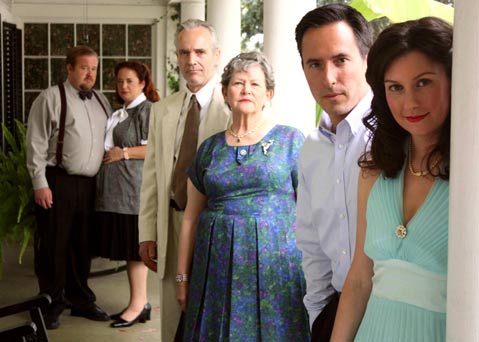Cat on a Hot Tin Roof
L.A.-based Nola Productions Brings Tennessee Williams’s classic to Center Stage

In this production of the Tennessee Williams classic, there are only two dramatic lighting cues. The first, which hits the stage before any actors enter, highlights the substantial bar located near the foot of a rumpled bed. The second, a pool of red, centers on the bed itself, where Maggie “The Cat” Pollit clutches her husband, Brick, in a desperate plea for intimate connection. The bed and the bar are of course symbols: for relationship on the one hand, and escape from it on the other.
Williams’s tragedy centers on a wealthy Southern family on the brink of collapse; Big Daddy Pollit is dying of colon cancer, and his heirs are engaged in a nasty struggle for control of his Mississippi Delta plantation. His younger son Brick, the darling of the family and an aging football star, has turned to drink after the death of his best friend. As played by Gordon Carmadelle, Brick is inscrutable, almost psychopathic in his lack of empathy for those who declare their love for him. Like his father, he eschews what he bitterly calls “mendacity”—the pattern of lies and deceits woven through his family. His wife Maggie, played by a riveting Megan Blakeley, is smart, beautiful, and driven. Her marriage into the Pollit family has raised her above poverty for the first time in her life, and despite her husband’s utter lack of interest in her or the estate, she’s hell bent on producing an heir. She is the titular cat, trapped in a state of extreme discomfort.
Whereas Maggie and even Brick are complex, nuanced characters; Brick’s older brother Gooper and his wife Mae are utter caricatures. They’re two-faced, money-grubbing, ingratiating types who eavesdrop, simper, and rub their fertility in Maggie’s face. As played by Jeffrey Olin and Ariella Fiore, respectively, they’re a comic and despicable duo. Likewise, Big Mama’s (Kenlyn Kanouse) shrill cheer and whimpering wound licking are so pathetic, it’s hard to see her as fully human. This may be due in part to casting choices, but the effect is to strengthen Brick’s position, namely, disgust. “Mendacity is the system we live in,” he spits bitterly near the end of the play. “Liquor is one way out; death is the other.” Of course, he has chosen the former, while Big Daddy is destined to exit the other way. Oh Rhyne captures the patriarch’s crass, self-important airs. Like his son, he believes in truth at any cost, even when it breaks hearts.
At nearly three hours with two intermissions, Nola’s Cat is a full evening, but this cast keeps the audience riveted to the Pollit family’s seemingly inevitable implosion.



